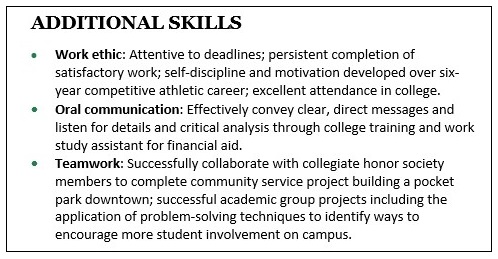Incorporating Employable Soft Skills Into the Introductory Communication Course

Two years ago, faculty in the Communication department at Allen Community College were considering ways to make the introductory communication course more practical and applicable for students. After all, most students don’t see themselves standing at the front of a room full of people giving speeches in their careers; however, they do acknowledge the need for effective communication skills. At the same time, employers are pleading for job applicants with soft skills—fundamental professional behaviors. In fact, one study found that 60 percent of employers cited communication and interpersonal skills as deficient in most job applicants (White, 2013).
The convergence of the nation’s workforce needs and the department’s desire to implement more practical skill development into its classes led Communication faculty to ask the following question: Why not integrate a specific focus on soft skills into the public speaking class? This idea led to piloting a new course outcome and evaluation tools that require very little additional preparation or instruction. By including a soft skills component into the communication course the following semester, students walked away with tangible, evidence-based skills that made them more employable.
Identifying a Soft-Skills Focus
As opposed to more tangible, job-specific hard skills, such as computer coding, marketing strategies, or medical terminology, soft skills are qualities and attributes that employers require of all applicants, regardless of their position. Although there are various interpretations of exactly what soft skills are, many are communication-based and can be taught and acquired through a variety of communication courses.
An article in Forbes identified five of the top ten desired employment skills as communication, listening, self-awareness, empathy, and patience (Lipman, 2019). According to the employment website Monster, soft skills are identified as verbal and written communication, teamwork, adaptability, problem solving, critical observation, conflict resolution, and leadership (Bortz, 2017). CareerBuilders surveyed hiring managers and human resources directors who identified the following soft skills, shown from most to least often recommended (Lucas, 2014):
- Strong work ethic
- Dependable
- Positive attitude
- Self-motivated
- Team-oriented
- Organized, able to manage multiple priorities
- Works well under pressure
- An effective communicator
- Flexible
- Confident
A review of workforce needs and existing course outcomes led Allen Community College faculty to identify which soft skill competencies could best be incorporated into the introductory communication course curriculum. Five measurable components related to soft skills are currently the focus: punctuality and self-motivation, work ethic, listening, oral communication, and teamwork.
Assignments That Develop Soft Skills Awareness
Helping students learn about and understand the need for soft skills is essential.
The semester at Allen Community College begins with students accessing resources, including written materials and videos, that define and explain the need for soft skills. Next, students identify specific public communication skills needed for their career of choice through research and interviews. In addition, local human resources managers and/or corporate leaders are invited to class to discuss current skills deficiencies; this adds an element of reality to assignments and allows students to ask questions related to their own interests. Throughout the semester, the following course components are applied to measure each student’s achievement of the competencies:
- Class attendance = punctuality and self-motivation
- Cumulative grade on submission of all assignments and deadlines met = work ethic
- Cumulative grade on literal and critical listening assignments = listening
- Cumulative grade on preparation and delivery of speeches = oral communication
- Grade based on group projects/presentations = teamwork
Again, these are standard course assignments and expectations that are being assessed uniquely in order to give students a different perspective on their accomplishments during the semester.
Assessing Soft Skills Proficiency
At both midterm and end of semester, students are given the results of their skills proficiency. The midterm assessment provides a barometer of how their soft skills are developing and a glimpse at how coursework competencies may be featured as essential skills on professional résumés. More importantly, because of students’ awareness of the need for these skills to be competitive in the job market, they interpret the attainment of soft skills in a whole new way. Students now see, for instance, that skipping class demonstrates a lack of punctuality and self-motivation, and that failing to prepare adequately for a speech shows the absence of a strong work ethic or effective oral communication skills. The educational benefits of this awakening are marked. For example, one student discovers that she is adept at demonstrating punctuality, listening, and teamwork skills, but needs to strengthen her demonstration of a strong work ethic and oral communication (see Figure 1).
Figure 1. Example of a Soft Skills Evaluation

Two final assessments—the development of a skills section for professional résumés and mock job interviews—provide practical, verifiable evidence of the soft skills students have gained as well as areas they can continue to focus on and develop throughout their education. On their résumés, students list the skills for which they have demonstrated above average proficiency and at least one example of how they have employed a skill successfully (see Figure 2). In the mock interview, students incorporate the soft skills they have learned into their responses to traditional interview questions. Through these practical experiences, students leave the course with public speaking skills as well as a tangible, personally applicable tool that is relevant to them and their futures.
Figure 2: Example of Soft Skills Added to a Résumé

The immediacy and consistency of the plea from our nation’s employers for a workforce with soft skills requires educators to respond. This demand creates a great opportunity for instructors of the introductory communication course to add components that will directly apply to and give students a competitive edge as they develop skills that will make them more employable and better able to achieve their career goals. Awareness and incorporation of a soft skills-based outcome has been, from students’ perspectives, one of the most practical experiences gained in class. As faculty, giving students this advantage is very rewarding.
References
Bortz, D. (2017, December 21). Soft skills to help your career hit the big time. Monster.com. Retrieved from www.monster.com/career-advice/article/soft-skills-you-need
Lipman, V. (2019, February 5). Management tip: Soft skills can be hard to find. Forbes. Retrieved from www.forbes.com/sites/victorlipman/2019/02/05/management-tip-soft-skills-can-be-hard-to-find/#8cdfadf5f68e
Lucas, S. (2014, April 10). Job hunters, don’t overlook your ”soft skills.” CBS News. Retrieved from www.cbsnews.com/news/job-hunters-dont-overlook-your-soft-skills
White, M. C. (2013, November 10). The real reason new college grads can’t get hired. Time. Retrieved from business.time.com/2013/11/10/the-real-reason-new-college-grads-cant-get-hired
Photo caption: An Allen Community College student demonstrates multiple soft skills in his public speaking class.
Terri Piazza is a Communication instructor at Allen Community College in Iola, Kansas.
Opinions expressed in Innovation Showcase are those of the author(s) and do not necessarily reflect those of the League for Innovation in the Community College.










